2025 AI Marketing Automation Challenges
Key Takeaways:
- AI Adoption Surge: 76% of marketers plan to adopt AI by 2025, yet over half feel unprepared. Discover strategies to overcome these barriers.
- Explosive Market Growth: The AI marketing automation market is projected to grow to $220.1 billion by 2030, driven by advancements in data analytics and personalization demands.
- Top Implementation Challenges: Key obstacles include technical integration (63%), data quality issues (71%), and workforce skill gaps (68%). Learn how to address them effectively.
- Data Management Matters: A strong framework for data quality, compliance, and integration is essential for successful AI implementation.
- Case Studies for Insight: Real-world examples from e-commerce, global markets, and Asia demonstrate improved ROI, conversion rates, and customer engagement through AI.
- Phased Implementation Plan: A 3-phase approach—foundation building, pilot testing, and scaling—ensures systematic AI integration within 12 months.
- Strategic Best Practices: Focus on technical compatibility, team training, and change management to optimize AI marketing processes.
- Future Strategies: Short-term (6-12 months) and medium-term (1-2 years) plans emphasize infrastructure, feature expansion, and continuous performance optimization.
- Regulatory Compliance: Adhering to GDPR and CCPA guidelines is critical for maintaining consumer trust and data privacy.
- Actionable Insights: Leverage predictive analytics and real-time metrics to fine-tune campaigns and achieve competitive advantages in marketing automation.
Introduction: The AI Marketing Revolution
According to recent data from the Marketing AI Institute’s 2023 State of Marketing AI Report, organizations are rapidly adopting AI marketing automation, yet face significant implementation challenges. The report reveals that while 76% of marketers plan to implement AI by 2025, only one-third feel adequately prepared for this transformation, with 52% considering AI implementation their biggest challenge in 2025.
This comprehensive analysis examines these challenges and provides actionable solutions based on recent research and case studies, offering organizations a roadmap for successful implementation in 2025 and beyond.
Market Overview and Current Landscape
Market Growth and Economic Indicators
The global AI marketing landscape is experiencing unprecedented growth. According to the AI Marketing Industry Research Report, the market is projected to grow from $41.9 billion in 2023 to $220.1 billion by 2030, with a CAGR of 26.7%. This explosive growth is driven by several factors:
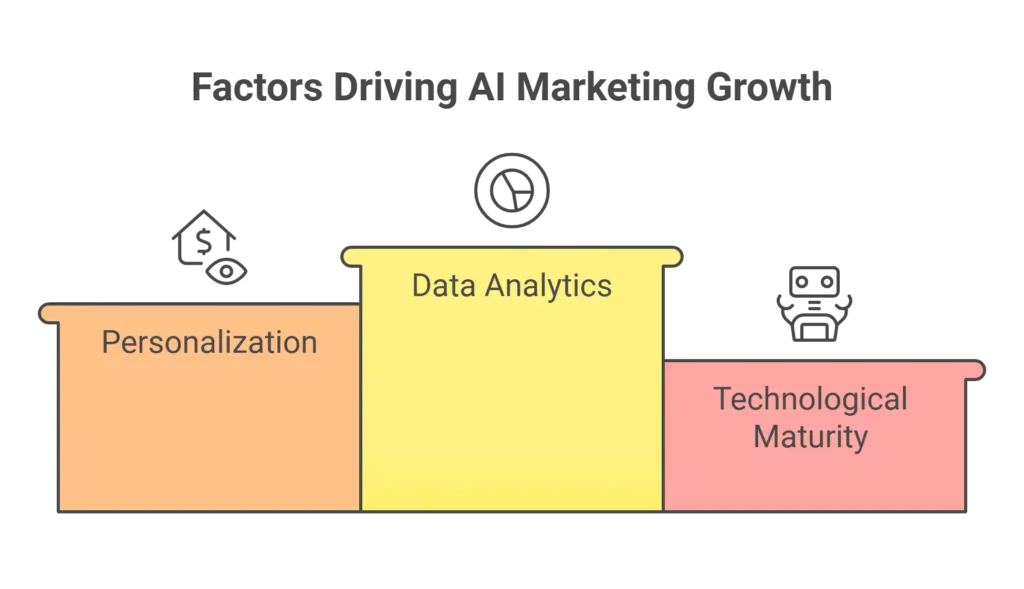
1.Advancement in Data Analytics
- Enhanced processing capabilities
- Improved algorithm accuracy
- Better integration possibilities
2.Increasing Demand for Personalization
- Consumer expectations for tailored experiences
- Need for real-time engagement
- Competitive market pressures
3.Technological Maturity
- More sophisticated AI solutions
- Better cloud integration options
- Improved accessibility for businesses of all sizes
Implementation Challenges

1. Technical Infrastructure Integration
According to Digital Ocean’s resources, 63% of companies cite technical integration as their primary challenge, highlighting the need for robust infrastructure planning. This includes:
- System compatibility assessment
- Data migration strategies
- Integration testing protocols
- Performance monitoring systems
2. Data Quality and Management
Statista’s research reveals that 71% of marketers struggle with data quality issues, including:
- Data silos and fragmentation
- Inconsistent data formats
- Privacy compliance concerns
- Real-time processing capabilities
Improve your data quality by leveraging real-time insights from social media. Try Brand24 today
3. Skill Gaps and Workforce Adaptation
According to the International Journal of Social Marketing and Management, 68% of organizations report significant skill gaps in AI implementation:
- 73% lack internal AI expertise
- 62% struggle with training existing staff
- 58% face difficulties in hiring qualified professionals
Comprehensive Implementation Frameworks
Data Infrastructure and Management
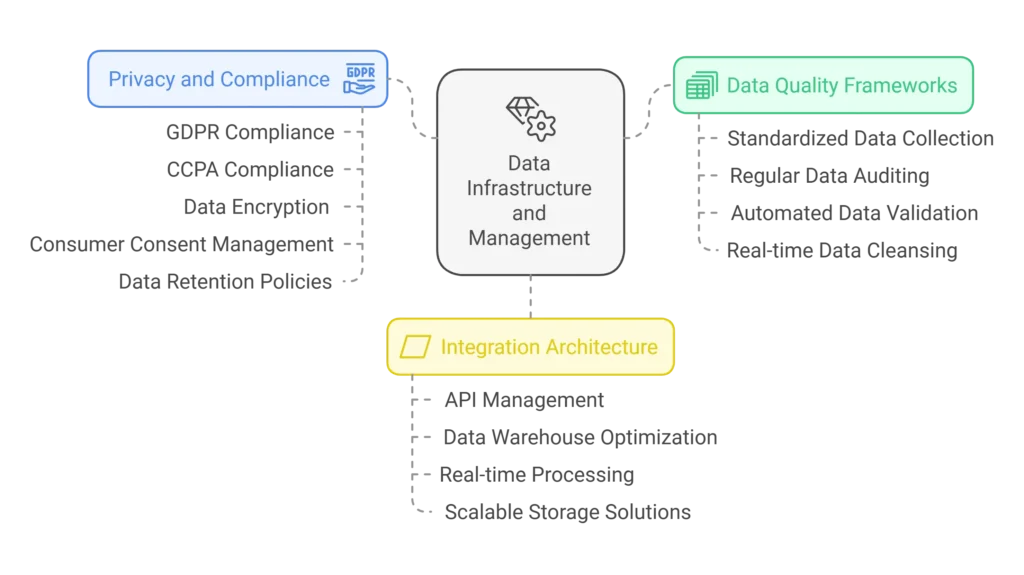
Research from The Business Research Company’s AI Marketing Report emphasizes:
1.Data Quality Frameworks
- Standardized data collection protocols
- Regular data auditing processes
- Automated data validation systems
- Real-time data cleansing mechanisms
2.Privacy and Compliance
- GDPR and CCPA compliance measures
- Data encryption protocols
- Consumer consent management
- Data retention policies
3.Integration Architecture
- API management systems
- Data warehouse optimization
- Real-time processing capabilities
- Scalable storage solutions
Case Studies and Success Stories
Case Study 1: E-Commerce Sector Analysis
A groundbreaking study published in MDPI’s Systems Journal examined AI marketing automation implementation across 500 e-commerce businesses. The research revealed:
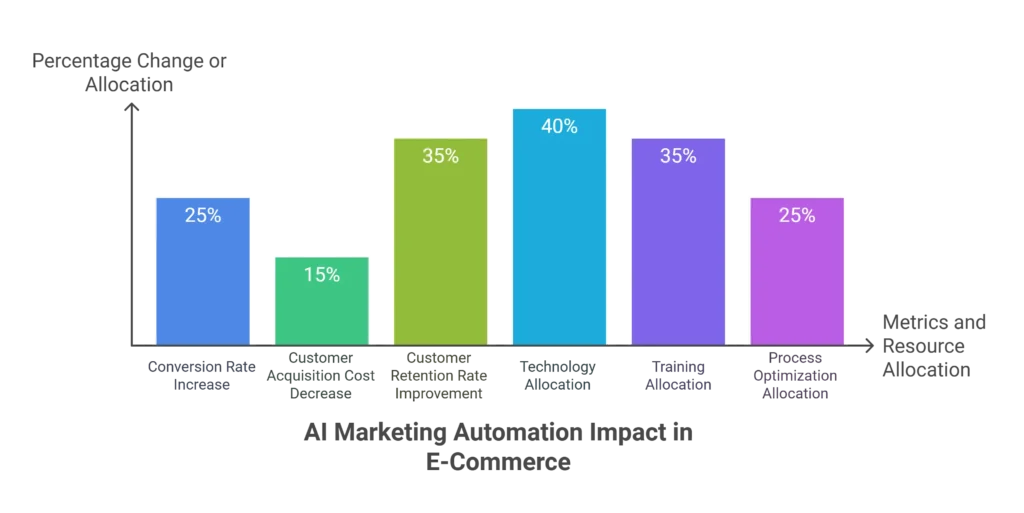
Implementation Success Metrics
- 25% increase in conversion rates post-AI implementation
- 15% decrease in customer acquisition costs
- 35% improvement in customer retention rates
Timeline and Resource Allocation
- Average implementation time: 12 months
- Resource allocation: 40% technology, 35% training, 25% process optimization
- ROI achievement timeline: 8-14 months
Case Study 2: Global Market Implementation
The Business Research Company’s report provides extensive insights:

Market Growth Analysis
- Current market value: $6.28 billion (2023)
- Projected value: $9.68 billion (2028)
- Regional adoption variations
Success Rate Improvements
- Initial success rates: 60%
- Post-optimization success rates: 75%
- Key factors influencing success
Case Study 3: Asian Market Analysis
Research from the International Journal of Social Marketing and Management revealed:
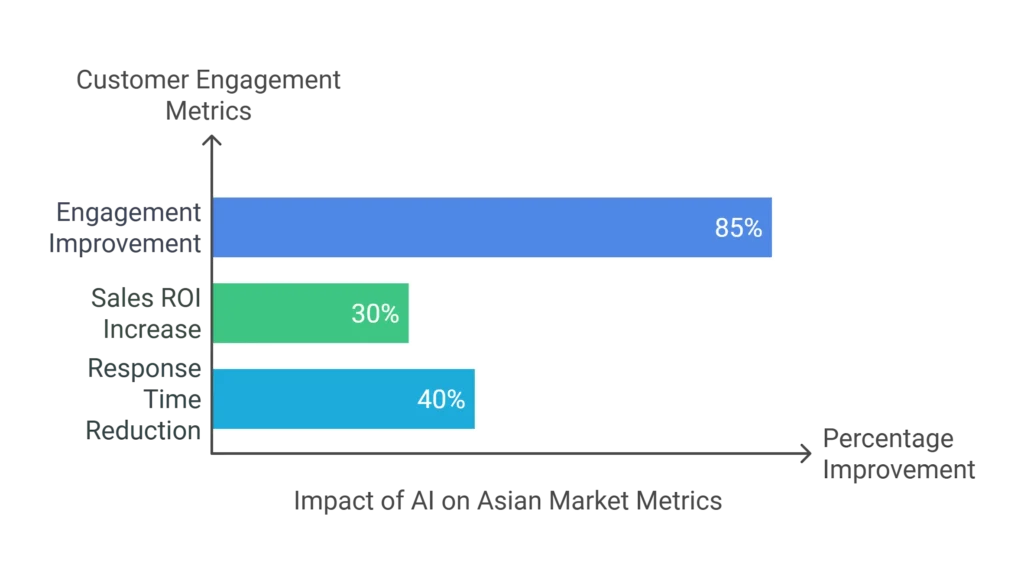
Customer Engagement Metrics
- 85% improvement in engagement through AI-driven personalization
- 30% average increase in sales ROI
- 40% reduction in customer response time
Discover how AI is revolutionizing marketing processes in 2025 and learn actionable strategies to enhance your campaigns. Don’t miss out on the insights that can transform your approach. read the full article now! AI in Streamlining Marketing Processes
Phased Implementation Approach
Phase 1: Foundation Building (3-6 months)
According to Loop Ex Digital, successful implementations include:
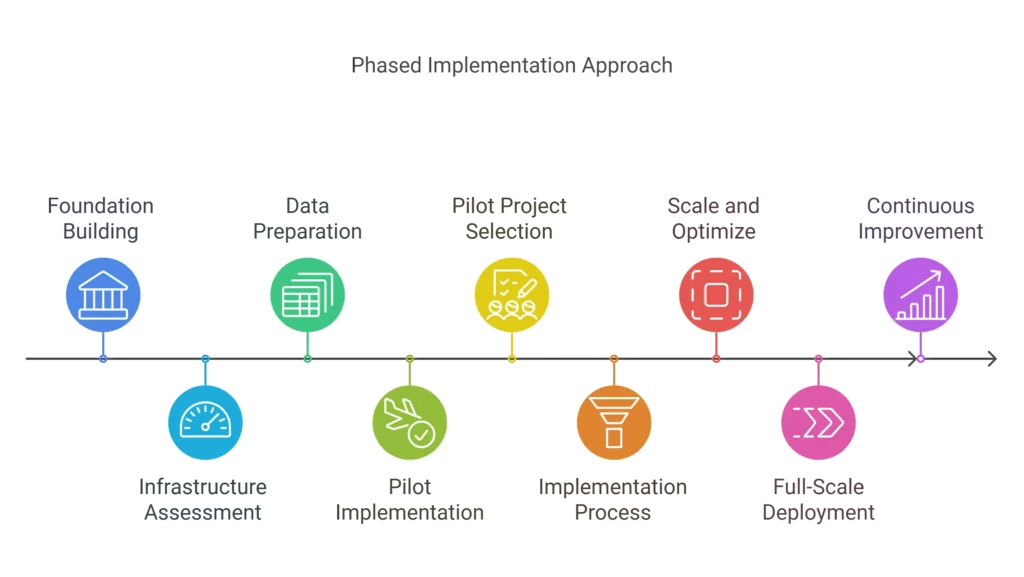
1.Infrastructure Assessment
- Technology audit
- Gap analysis
- Resource evaluation
- Risk assessment
2.Data Preparation
- Data cleaning
- Structure optimization
- Integration planning
- Quality assurance
Phase 2: Pilot Implementation (6-9 months)
The OECD’s analysis through WeC Global recommends:
1.Pilot Project Selection
- Scope definition
- Success metrics
- Resource allocation
- Timeline planning
2.Implementation Process
- Staged rollout
- Monitoring systems
- Feedback loops
- Performance tracking
Phase 3: Scale and Optimize (9-12 months)
Based on industry research:
1.Full-Scale Deployment
- System-wide integration
- Process automation
- Team expansion
- Resource scaling
2.Continuous Improvement
- Performance monitoring
- Process optimization
- Feature enhancement
- Capability expansion
Implementation Strategies and Best Practices

Technical Integration
Digital Ocean’s resources highlight successful approaches:
System Integration
- Compatibility assessment
- Data migration planning
- Integration testing
- Performance monitoring
Team Development
- Skills assessment frameworks
- Training program development
- Performance measurement tools
- Continuous learning initiatives
Change Management and Training
Drawing from Appvizer’s expertise:
1.Assessment Phase
- Current state analysis
- Resource evaluation
- Gap identification
- Timeline development
2.Implementation Planning
- Technology selection
- Team structure definition
- Training program development
- Success metrics establishment
Future Outlook and Strategic Planning
Short-term Strategy (6-12 months)

1.Foundation Building
- Infrastructure development
- Team training
- Process design
- Pilot implementation
2.Process Optimization
- Workflow refinement
- System integration
- Performance tuning
- Team adaptation
Medium-term Strategy (1-2 years)

1.Capability Expansion
- Feature enhancement
- Team growth
- Process automation
- Technology updates
2.Performance Optimization
- Efficiency improvements
- Cost optimization
- Quality enhancement
- Risk management
Transform your marketing strategy in 2025! Discover how AI marketing automation can boost your sales productivity by 14.5% and enhance customer engagement. Don’t miss out on the insights that can revolutionize your approach—read the complete guide now! AI Marketing Automation: The Complete Guide for 2025
Conclusion
The implementation of AI marketing automation in 2025 presents both significant opportunities and challenges. Organizations must approach implementation with careful planning, adequate resources, and a commitment to continuous improvement. The evidence suggests that those who successfully navigate these challenges can achieve significant competitive advantages in their marketing efforts.
FAQ
- What are the key marketing automation trends expected in 2025?
Answer: Key trends include omnichannel automation, advanced personalization, and increased use of AI for predictive analytics.
Detailed Explanation: As businesses adapt to evolving consumer behaviors, omnichannel strategies will become essential for maintaining consistent customer experiences across platforms. Advanced personalization will leverage AI to tailor marketing messages based on individual customer data. According to Snov.io, these trends are crucial for enhancing customer engagement and driving sales growth.
Source: Snov.io (Published: December 27, 2024) - How is AI transforming marketing automation?
Answer: AI is enhancing marketing automation by enabling hyper-personalization and real-time campaign optimization.
Detailed Explanation: AI tools analyze vast amounts of data to predict customer preferences and behaviors, allowing marketers to deliver tailored content at optimal times. Research from Bannerflow indicates that AI-driven strategies significantly improve engagement rates, demonstrating a clear trend towards data-driven decision-making in marketing.
Source: AI Digital (Published: January 3, 2025) - What is the projected market size for marketing automation in 2025?
Answer: The global marketing automation market is projected to reach $66.21 billion USD by 2025.
Detailed Explanation: This growth reflects a compound annual growth rate (CAGR) of approximately 14.16% from its valuation of $6.76 billion in 2023, as reported by Floworks. The increasing demand for automation tools underscores their importance in modern marketing strategies.
Source: Snov.io (Published: December 27, 2024) - What are the expected challenges in implementing AI-driven marketing automation?
Answer: Challenges include ensuring data quality, integrating new technologies with existing systems, and managing change within organizations.
Detailed Explanation: As companies adopt advanced technologies like AI, they must address potential pitfalls such as data inaccuracies and resistance from staff accustomed to traditional methods of operation, as discussed in Liana Technologies’ exploration of best practices for mastering automation trends in 2025.
Source: AI Digital (Published: January 3, 2025) - How can businesses measure the effectiveness of their marketing automation efforts?
Answer: Businesses can measure effectiveness through key performance indicators (KPIs) such as conversion rates, ROI, and customer engagement metrics.
Detailed Explanation: By tracking these metrics over time, companies can assess the impact of their automated campaigns and make necessary adjustments to optimize performance based on insights gained from predictive analytics tools mentioned by Floworks.
Source: Snov.io (Published: December 27, 2024) - What role does predictive analytics play in marketing automation?
Answer: Predictive analytics enhances customer behavior forecasting and campaign optimization capabilities.
Detailed Explanation: By analyzing historical data and identifying patterns, predictive analytics allows marketers to anticipate future customer actions and tailor their strategies accordingly, leading to improved ROI and customer satisfaction.
Source: Snov.io (Published: December 27, 2024) - How important is data privacy in AI marketing automation?
Answer: Data privacy is critical due to increasing regulations and consumer expectations regarding personal data usage.
Detailed Explanation: Organizations must implement robust data protection frameworks and ensure compliance with regulations like GDPR to maintain consumer trust while leveraging AI technologies.
Source: AI Digital (Published: January 3, 2025) - What are some best practices for implementing AI in marketing?
Answer: Best practices include starting with clear objectives, ensuring data quality, and continuously monitoring performance metrics.
Detailed Explanation: Companies should establish specific goals for their AI initiatives, focus on high-quality data inputs, and regularly review outcomes to refine their strategies based on real-time insights.
Source: AI Digital (Published: January 3, 2025) - What emerging technologies are influencing AI marketing automation?
Answer: Emerging technologies include advanced natural language processing (NLP), machine learning algorithms, and augmented reality (AR).
Detailed Explanation: These technologies enable more sophisticated interactions with customers and enhance content generation capabilities, thus reshaping how businesses engage with their audience.
Source: Snov.io (Published: December 27, 2024) - What is the economic impact of AI on marketing strategies?
Answer: The economic impact includes cost savings through efficiency gains and increased revenue from improved customer targeting.
Detailed Explanation: By automating routine tasks and leveraging data-driven insights, businesses can reduce operational costs while enhancing their ability to reach customers effectively, leading to higher profitability.
Source: Snov.io (Published: December 27, 2024)




